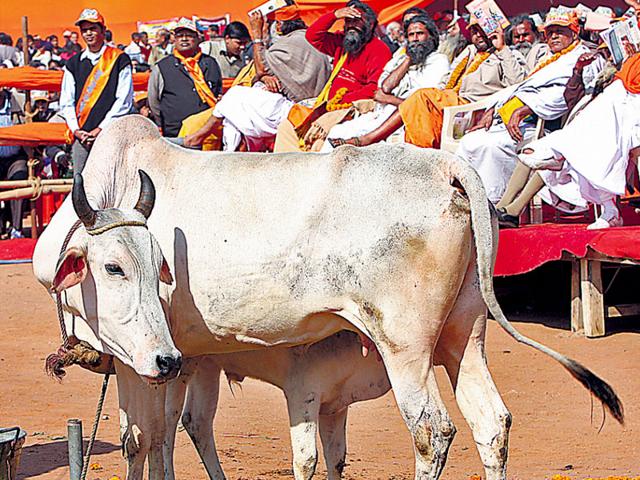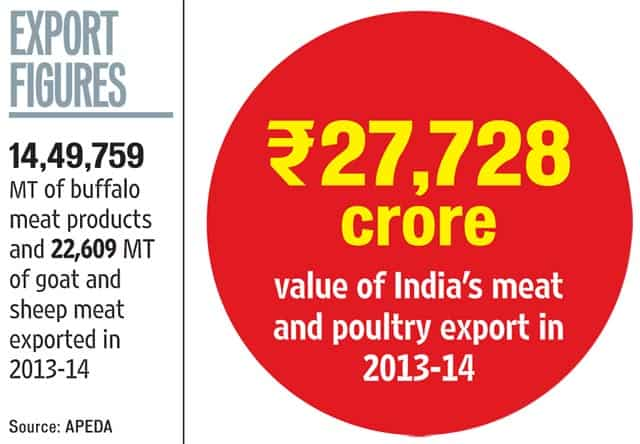Playing now on India's political stage: The moo story
What we eat and what we do not dictates our view of others, how we live and where. Now, with the beef ban, food taboos have jumped off plates and onto India's political stage.
Let's begin with a fable: It's 2050 and Bharat has finally achieved peace and prosperity. The wide tree-lined roads are pothole-free; garbage doesn't lie in mounds at street corners because everything is quickly recycled - crushed cars become Ron Arad-inspired art installations; plastic bags become handkerchiefs, buckets, airplanes; sewage is converted into fertiliser used on fully-mechanised farms that yield oranges the size of footballs, apples as big as those square easy-to-stack Japanese melons and rice grain so large and numerous, hunger has been banished. The people are gracious and should Babar get onto Marty McFly's chariot, he would immediately revise his opinion of the landscape and the natives.

For the native of Hindustan, especially the male of the species is now so evolved, he discusses politics, religion and cricket sedately, having eschewed ranting, raving, rioting and raping. He treats all women, not just mummyji, with great respect, never more holds serious discussions with random mammaries, watches porn strictly for its educational aspects, and uncomplainingly does household chores. He is now so respectable, he is deathly boring. Consequently, the women of Bharat can slip into itsy bitsy teeny weeny yellow polka dot bikinis and wander unmolested down city streets in the dead of night. But they do so only after pulling a bed sheet over themselves because, having imbibed the pristine culchaar of the land, they are obedient and coy. If there is a paradise on earth/ It is this, it is this, it is this.
This sudden and glorious transformation can be dated very precisely to circa 2020 when all the states of Bharat outlawed the consumption of beef. At the time, this was a contentious issue. Demented secularists, many of whom themselves observed food taboos of their own group and for good measure also adopted the historical 'other's' aversion to porcine products, were quick to protest. The Adarsh Liberals (Thank you, Twitter) were agitated that the rights of fellow Indians were being trampled upon. Thankfully, other groups who regularly munched on bovines saw the folly of their ways and began shifting to veggie-and-paneer diets. Consequently, their sharp canines have now been blunted and the men no longer seek to wage love jihad. At last, Vedic Utopia arrivato as they say in uh, Italian.

OK, end of fable. Food taboos have always been followed with varying degrees of strictness by communities in India. The idea of purity and pollution, of the magical ability of foods to affect behaviour is a central belief in Hinduism and shows up in the Ayurvedic classification of different personalities as satvik, rajasik and tamasik. Judaism and Islam too have their taboos with a preference for kosher and halal foods and a horror of pork. The Jains, that most abstemious of religious groups, avoid all sorts of meat and like many observant brahmins, who consider onions and garlic capable of transforming the consumer into a depraved sex maniac, do not include it in their cooking - behold Mumbai's famous Jain pao bhaji.
All this is very well, even welcome to a certain degree, especially when it leads to the establishment of stricter animal protection rules in a world increasingly reliant on unsustainable factory farming that cuts the ancient thread between man and the animals he rears. Sadly, though, it isn't animal welfare that's at the core of the move to enforce the Hindu beef taboo. If it were, buffalo meat, which is not prohibited in Maharashtra or Haryana, the two states that have pushed through the beef ban, would also be off the butcher's hook.
Alas, the buffalo is black - Kancha Iliah has memorably remarked about the "racism" that allows these creatures to be treated so differently - and besides, it's probably good karma to slaughter Yama's vehicle which wallows joyfully in slush. As with many social phenomena in modern India including segregated housing and marriage sites that allow you to pick someone from your own subcaste to passionately fight with for the rest of your life, the origin of this selective bovine discrimination can be traced to what we choose to ladle onto our plates.
Why a group might decide not to tuck into a rare steak, sample dog stew, feast on pork sorpotel, or indulge in a roly poly pudding with a kitten in it is connected not just to the respect accorded to companion animals but is rooted in the community's social history. Why, for instance, should the English react with revulsion to the sale of horse flesh but salivate over a plate of roast beef? Why do some Chinese think dogs are delicious? And why is it verboten to eat camel in Rajasthan but not in Saudi Arabia? And really, why are many Hindus horrified at the slaughter of cows but couldn't care less about the unfortunate buffalo?
The exalted space that the cow occupies within contemporary Hinduism can perhaps be traced not just to our pastoral past but also to Adi Shankaracharya's successful attempt to reestablish Hinduism as the preeminent belief system in the subcontinent back in the 8th century. If a clearer idea of what it means to be Hindu emerged from interactions with Islamic arrivals and with later colonists, shared taboos could have served to strengthen bonds across diverse caste groups.
It's unsurprising then that Hindutva has chosen to underline its growing influence by enforcing the beef taboo both on modern India's new outsiders - native Christians and Muslims - and old ones like the dalits, for whose souls everyone has been competing ferociously for the last few hundred years. Viewed alongside reconversions, attacks on places of worship and strident displays of religiosity by political leaders, it's a move intended to discomfit minorities.
It's unclear if, like in the fable at the start of this article, non-Hindu groups will enthusiastically begin opting for paneer instead of paya, and indeed, if this exclusion of beef heralds a general shift towards militant vegetarianism that will see meat-eating Hindu groups - yes those good folk who reserve their vegetarianism for Tuesdays and the month of Shravan - also give up their favourite pounds of flesh. This isn't a far-fetched train of thought considering that traditionally, when particular castes in India seek Sanskritisation they begin by striking meat off the menu.
It's unclear too if those states that have banned cow slaughter will look after the numerous starving heads of cattle that wander down city streets feasting at garbage dumps on the plastic bags that will eventually kill them. It is also unclear if they will penalise farmers compelled to abandon aged cows that can now no longer be sold for meat.
Let's return to our fable: It's 2050 and Bharat is peaceful, its roads are pothole-free, there are no mounds of garbage and nobody wears leather. Then, suddenly, a Vedic Dystopia is revealed: there are millions of cows but all of them are being milked to death in factory farms. Afterwards, their rotting carcasses are sold at secret markets. Those who are compelled to eat them - "for ye have the poor with you always" - will sicken and die.
Meanwhile, the good citizens of Hindustan snore gently as they digest their hearty meals of paneer pasanda, paneer pakoda, paneer fried rice, paneer mutter, paneer paratha.
If there is a paradise on earth/ It is this etcetera.
Get Current Updates on India News, Lok Sabha Election 2024 live, Infosys Q4 Results Live, Elections 2024, Election 2024 Date along with Latest News and Top Headlines from India and around the world.




